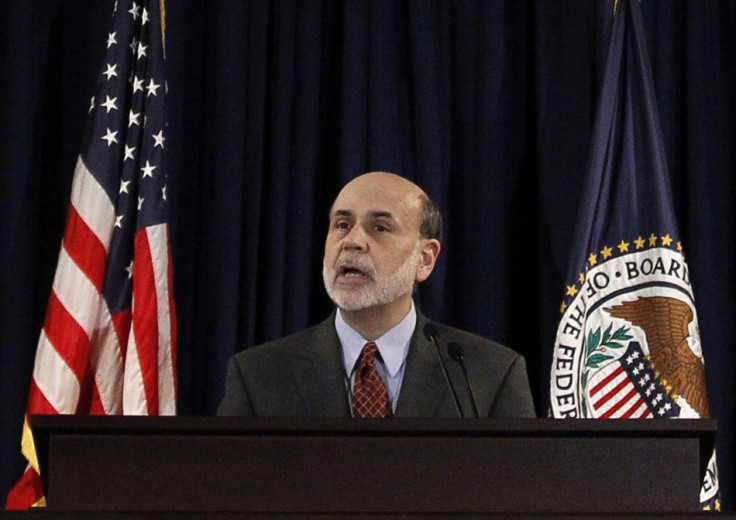Bernanke: Economy Has Slowed, But Likely to Pick-up

The head of the world's most powerful central bank Wednesday, in only his second post interest rate-decision news conference, reinforced evaluations forwarded by the U.S. Federal Reserve's Wednesday rate decision and statement, namely: that it's prudent to end the second phase of quantitative easing, or QE2, despite the U.S. economy's recent slowing.
Part of the slowdown is temporary, Fed Chairmen Ben Bernanke said at Wednesday's news confernce, adding that, We [The Fed] believe that growth is going to pick-up.
If the U.S. economy does rev-up in the second half of 2011, it probably will be from a lower growth rate, as the Fed cut its GDP growth forecast for the immediate years ahead. For 2011, the Fed now sees U.S. GDP growth of 2.7% to 2.9%, down from April's 3.1% to 3.3% growth forecast; and 2012 growth of 3.3% to 3.7%, down from April's 3.5% to 4.2% forecast.
The Fed also continues to see only benign, or low inflation, expecting the 2011 Core personal consumption expenditure index, or Core PCE, to increase 1.5% to 1.8%; that's up slightly from April's 1.3% to 1.6% forecast. In 2012, the Fed sees Core PCE rising 1.4% to 2.0%, up slightly from April's 1.3% to 1.8% 2012 forecast.
On the Greece national debt issue, Bernanke said if European officials do not address the problem, it is capable of affecting not only Europe's credit markets, but the U.S.'s, as well. As of Wednesday at mid-day European officials appear prepared to extend additional credit to the beleagured Mediterranean nation, but want Greek government officials to implement another round of spending cuts and revenue increases, as a condition for additional aid.
Bernake's news conference -- only the second folowing a Fed rat announcemet in the Federal Reserve's history -- occured minutes after the Fed, as expected, kept its Federal funds rate target the same, and also agreed to let the second phase of its quantitative easing program lapse. That program involved buying $600 billion in U.S Treasury bonds though the end of this month. The Fed, howeever will continue to reinvest princiapal payments from its securities holdings, adding that it is prepared to adjust those holdings as appropriate.
The Fed also, as expected, kept its extended period language because it continues to anticipate that economic conditions -- including low rates of resource utilization and a subdued outlook for inflation over the medium run--are likely to warrant exceptionally low levels for the federal funds rate for an extended period.
However, the Fed downgraded its assessment of the U.S. economy, noting that the economic expansion continued in the second quarter at a moderate pace, although somewhat more slowly than expected. Even so, the Fed term the current slowdown in GDP growth as likely to be temporary, reflecting short-term factors, such as the drag effect of higher food and energy prices on consumer purchasing power and spending. The Fed also cited supply chain disruptions stemming from the spring earthquake and tsunami in Japan.
During the financial crisis acute stage in the fall 2008 / winter 2009, the Fed commenced an unprecented intervention in to the U.S. economy to both re-liquefy and stabilize credit marks and to provide economic stimulus after the bursting of the housing bubble plunged the economy into its worst recession since the Great Depression of the 1930s.
That Fed's quantiatative intervention, among other actions, resulted in a doubling of the Federal Reserve's balance sheet, but has also generally been credited with maintaining both U.S. and global credit market liquidity and providing modest stimulus to the economy.
© Copyright IBTimes 2024. All rights reserved.





















